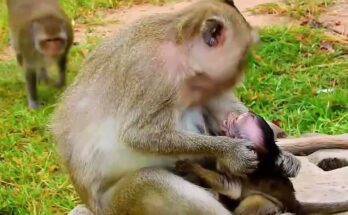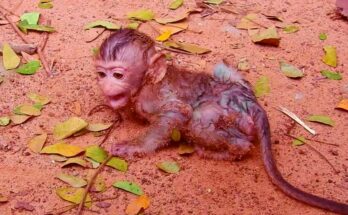In the vast world of wildlife and nature videos, baby animals often capture our hearts with their innocent eyes and fragile bodies. Among these, baby monkeys are some of the most vulnerable creatures, yet surprisingly, they don’t always receive the sympathy or pity one would expect. The question arises: Why don’t people pity the baby monkey? This is an urgent call to everyone who watches or hears about these helpless creatures — please stop ignoring their pain, and start showing compassion.
Baby monkeys are incredibly dependent on their mothers and families for survival. They rely on their mothers for nourishment, protection, and guidance during the early stages of life. When separated from their mothers or abandoned due to injury, sickness, or human interference, baby monkeys face severe challenges. Unlike human infants, who often have caregivers or medical help readily available, these young primates are left to fend for themselves in harsh environments where predators, hunger, and exposure to the elements threaten their very existence.
Despite their vulnerability, many baby monkeys go unnoticed or ignored by people witnessing their suffering. In many cases, people watch videos or witness these animals’ distress but don’t feel moved enough to take action or empathize deeply. This lack of pity could stem from a few reasons: some people may consider them wild animals that must survive on their own, others might be desensitized by repeated exposure to such scenes online, or some simply don’t understand the emotional complexity and intelligence these young primates possess.
However, it’s important to remember that baby monkeys, like human babies, experience fear, pain, loneliness, and confusion. Their cries are genuine calls for help. When a baby monkey is left hungry, sick, or injured, it is a tragic sight that deserves our empathy and urgent attention. Pitying these creatures is not about feeling sorry for them in a helpless way; it’s about recognizing their pain and acknowledging our role in protecting and preserving wildlife, especially the most vulnerable.
Moreover, human activities such as deforestation, illegal pet trade, and habitat destruction often lead to the abandonment and endangerment of baby monkeys. By choosing not to pity them, we inadvertently contribute to their suffering by ignoring the consequences of our actions. Showing compassion means supporting conservation efforts, advocating for wildlife protection, and promoting awareness about the plight of baby monkeys.
The plea in the title, “Please Stop, Pity the Baby Monkey!”, is a heartfelt reminder that these creatures need more than just passive observation. They need voices that speak up for them, hands that help, and hearts that care. Every small act of kindness — whether it’s sharing awareness, donating to rescue centers, or supporting ethical wildlife organizations — can make a huge difference in the lives of these young primates.
In conclusion, pitying the baby monkey is not just about sadness; it is about compassion, responsibility, and action. It is a call to awaken our empathy and to remember that these innocent beings deserve our care and protection. The next time you see a baby monkey in distress, don’t turn away. Instead, stop and reflect — how can you help? Because pitying the baby monkey means valuing life and choosing kindness in a world that often forgets the most vulnerable.


